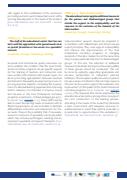with regard to the modification of the curriculum, promoting autonomy and independence and with a tutoring task adjusted to the needs of the student. [two. International. See: ISO 21001:2018 – Section 8.5.1.6.2]. ITEM 4.3.3 Educational Center The staff of the educational center that has con- tacts with the apprentices with special needs recei- ve special formation or has access in a specialists’ network Completely / Enough / Something / Nothing European and international quality assurance sys- tems establish the condition that the Dual Profes- sional Formative programs include specific support for the training of teachers and instructors who have contact with students with special needs. It is about promoting appropriation between teachers and trainers in the quality development process, im- proving response capacity, increasing the develop- ment of individual learning capacities and improving results. Likewise, it is intended to improve access and inclusion in the Dual Professional Formative programs, in particular, of disadvantaged groups [1. European. See: EQAVET I2, I3]. These staff must be able to meet the learning needs of students with di- fferent requirements, as well as be able to facilitate differentiated instruction and assessment for the- se needs. There is the possibility that, if necessary, access to a network of specialists can be provided, which may include psychologists, learning and de- velopment specialists and speech therapists. [two. International. See: ISO 21001:2018 – Section 7.2.2].ITEM 4.3.4 Educational Center The educational center applies additional measures for the persons and disadvantaged groups that include the support to the employability and the response to the evolution of the demand of the labor market. Completely / Enough / Something / Nothing Implementation projects should be prepared in consultation with stakeholders and should include explicit principles. They must support employability and improve the responsiveness of the Dual Professional Formative programs to changing demands in the labor market, but at the same time they must pay particular attention to disadvantaged groups. To this end, the adoption of additional measures to facilitate and improve the employability of these groups should be considered. This can be done by explicitly supporting appropriate and inclusive partnerships to implement planned initiatives. The European quality assurance systems include a series of indicators that can help measure this and can be used to support the evaluation and improvement of the quality of the Dual Professional Formative programs. [one. European. See: EQAVET I5,I6,I9]. The measures that can be adopted by the educational center can be, among others: a) support the joint construction of the learning process, attending to the needs of the students; b) facilitate a team environment with adequate resources to enable learners to reach their optimal potential; c) provide links to opportunities in the workplace [2. International. See: ISO 21001:2018 – Section 8.1.3].
